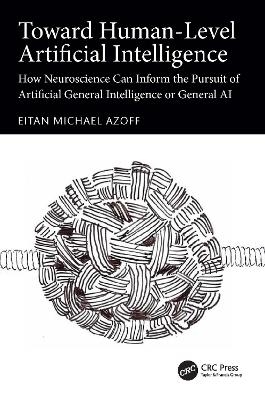
Toward Human-Level Artificial Intelligence
How Neuroscience Can Inform the Pursuit of Artificial General Intelligence or General AI
Seiten
2024
CRC Press (Verlag)
978-1-032-82907-4 (ISBN)
CRC Press (Verlag)
978-1-032-82907-4 (ISBN)
This book serves a dual purpose: first, offering a comprehensive survey of neuroscience and AI research pertinent to advancing towards human-level AI (HLAI), presenting key ideas and references for further exploration; second, it synthesizing these concepts to propose strategies for achieving HLAI.
Is a computer simulation of a brain sufficient to make it intelligent? Do you need consciousness to have intelligence? Do you need to be alive to have consciousness? This book has a dual purpose. First, it provides a multi-disciplinary research survey across all branches of neuroscience and AI research that relate to this book’s mission of bringing AI research closer to building a human-level AI (HLAI) system. It provides an encapsulation of key ideas and concepts and provides in-depth surveys of neuroscience and AI research related to the book's mission, providing all the references for the reader to delve deeper; much of the survey coverage is of recent pioneering research. Second, the final part of this book brings together key concepts from the survey and makes suggestions for building HLAI. This book provides accessible explanations of numerous key concepts from neuroscience and artificial intelligence research, including:
The focus on visual processing and thinking and the possible role of brain lateralization toward visual thinking and intelligence.
Diffuse decision making by ensembles of neurons.
The inside-out model to give HLAI an inner "life" and the possible role for cognitive architecture implementing the scientific method through the plan-do-check-act cycle within that model (learning to learn).
A neuromodulation feature such as a machine equivalent of dopamine that reinforces learning.
The embodied HLAI machine, a neurorobot, that interacts with the physical world as it learns.
This book concludes by explaining the hypothesis that computer simulation is sufficient to take AI research further toward HLAI and that the scientific method is our means to enable that progress. This book will be of great interest to a broad audience, particularly neuroscientists and AI researchers, investors in AI projects, and lay readers looking for an accessible introduction to the intersection of neuroscience and artificial intelligence.
Is a computer simulation of a brain sufficient to make it intelligent? Do you need consciousness to have intelligence? Do you need to be alive to have consciousness? This book has a dual purpose. First, it provides a multi-disciplinary research survey across all branches of neuroscience and AI research that relate to this book’s mission of bringing AI research closer to building a human-level AI (HLAI) system. It provides an encapsulation of key ideas and concepts and provides in-depth surveys of neuroscience and AI research related to the book's mission, providing all the references for the reader to delve deeper; much of the survey coverage is of recent pioneering research. Second, the final part of this book brings together key concepts from the survey and makes suggestions for building HLAI. This book provides accessible explanations of numerous key concepts from neuroscience and artificial intelligence research, including:
The focus on visual processing and thinking and the possible role of brain lateralization toward visual thinking and intelligence.
Diffuse decision making by ensembles of neurons.
The inside-out model to give HLAI an inner "life" and the possible role for cognitive architecture implementing the scientific method through the plan-do-check-act cycle within that model (learning to learn).
A neuromodulation feature such as a machine equivalent of dopamine that reinforces learning.
The embodied HLAI machine, a neurorobot, that interacts with the physical world as it learns.
This book concludes by explaining the hypothesis that computer simulation is sufficient to take AI research further toward HLAI and that the scientific method is our means to enable that progress. This book will be of great interest to a broad audience, particularly neuroscientists and AI researchers, investors in AI projects, and lay readers looking for an accessible introduction to the intersection of neuroscience and artificial intelligence.
Eitan Michael Azoff, PhD, is Chief Analyst at Cloud and Data Center Research Practice, Omdia, part of Informa.
Chapter 1 AI and machine learning. Chapter 2 Elements of neural networks history. Chapter 3 Brain properties. Chapter 4 Cognitive processes. Chapter 5 Time and space in the brain. Chapter 6 Theories of consciousness. Chapter 7 Neurorobotics: Embodied AI. Chapter 8 Engineered brain architectures. Chapter 9 AI hardware. Chapter 10 The possibility of creating HLAI.Chapter 11 Methods to build HLAI. Chapter 12 Beyond HLAI
| Erscheinungsdatum | 22.08.2024 |
|---|---|
| Zusatzinfo | 17 Line drawings, color; 9 Line drawings, black and white; 3 Halftones, color; 20 Illustrations, color; 9 Illustrations, black and white |
| Verlagsort | London |
| Sprache | englisch |
| Maße | 156 x 234 mm |
| Gewicht | 320 g |
| Themenwelt | Informatik ► Theorie / Studium ► Künstliche Intelligenz / Robotik |
| Medizin / Pharmazie ► Physiotherapie / Ergotherapie ► Orthopädie | |
| Naturwissenschaften ► Biologie ► Humanbiologie | |
| Naturwissenschaften ► Biologie ► Zoologie | |
| Technik ► Medizintechnik | |
| Technik ► Umwelttechnik / Biotechnologie | |
| ISBN-10 | 1-032-82907-9 / 1032829079 |
| ISBN-13 | 978-1-032-82907-4 / 9781032829074 |
| Zustand | Neuware |
| Informationen gemäß Produktsicherheitsverordnung (GPSR) | |
| Haben Sie eine Frage zum Produkt? |
Mehr entdecken
aus dem Bereich
aus dem Bereich
Buch | Softcover (2024)
REDLINE (Verlag)
CHF 27,95
Eine kurze Geschichte der Informationsnetzwerke von der Steinzeit bis …
Buch | Hardcover (2024)
Penguin (Verlag)
CHF 39,20
was sie kann & was uns erwartet
Buch | Softcover (2023)
C.H.Beck (Verlag)
CHF 25,20


